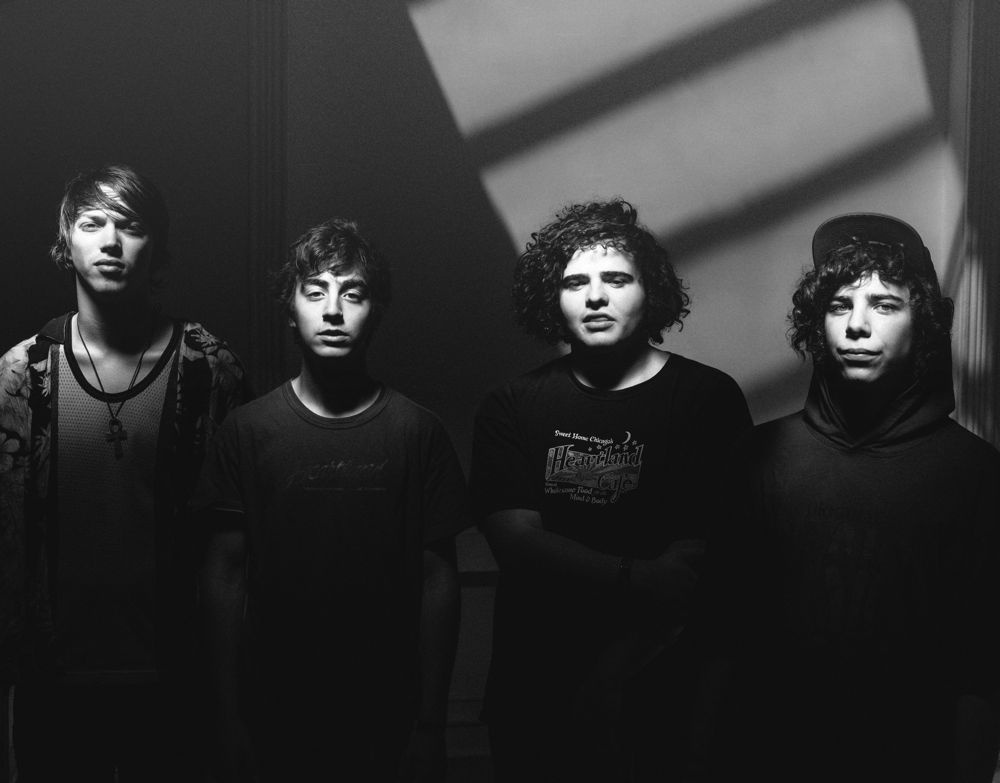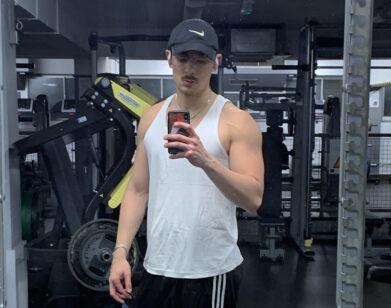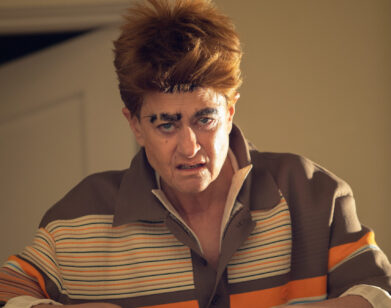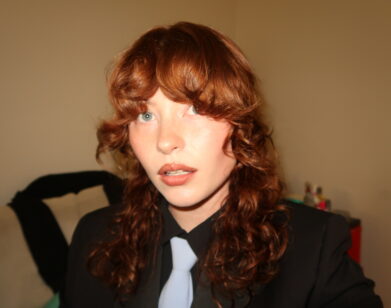Twin Peaks’s Chicago Pride

ABOVE: (LEFT TO RIGHT) CADIEN LAKE JAMES, CLAY FRANKEL, CONNOR BRODNER, AND JACK DOLAN AT SUN STUDIOS IN NEW YORK. PHOTO BY CHRISTOPHER GABELLO .
In a rush to have something to sell on their first tour last summer, Chicago lo-fi quartet Twin Peaks recorded and self-released their debut album, Sunken. A year later, and every music blog worth their Twitter followers is labeling them the “next best thing.” Tomorrow, the band will rerelease Sunken via Autumn Tone.
At 19 years old, the four members of Twin Peaks are young. To them, Liv Tyler is “that girl who played Arwen” and R. Kelly is a one-hit wonder. When they chose their name, it was not a reference to David Lynch’s cult-favorite show—they didn’t know the show existed. Their youthful enthusiasm fuels their tours; the band still tries to play house shows in every city they visit and are never deterred by a small crowd. “People will remember that there was no one here but these dudes still threw down,” front man Cadien Lake James tells us. “We like to be really explosive,” says bassist Jack Dolan.
Do not, however, mistake Peaks’ youth for inexperience. James, Dolan, guitarist Clay Frankel, and drummer Connor Brodner have been part of the Chicago DIY scene since they first started high school and count other Windy City bands White Mystery, The Funs, and The Orwells as their mentors. Yes, they are young, but they are also increasingly savvy.
EMMA BROWN: How did you all meet?
CADIEN LAKE JAMES: I met Jack in elementary school, and we went to school together through high school.
JACK DOLAN: I’ve known Connor since I was a baby. I grew up across the street from him, so we’ve known each other for a really long time.
CLAY FRANKEL: We all went to public schools, so we would all hang out with each other in Chicago.
DOLAN: Everyone kind of knows each other.
JAMES: Before [Clay] played with us, he was in a different band. We used to play lots of shows together and then we ended up stealing him from his other band.
BROWN: How does that work? Did you have to be sneaky?
CONNOR BRODNER: We did it slowly.
FRANKEL: I forget what the first thing was that you guys asked me to do.
JAMES: It was at a house party.
DOLAN: Yeah, we were like, “Come jam, man!”
FRANKEL: I was just playing guitar with them and then still playing in the other band. Then I went on tour with them and that’s that.
BROWN: What did you say to your old band? How do you break up with a band?
FRANKEL: Oh, it was pretty easy. Everyone just went to college, so that did that.
BROWN: Are any of you in college?
JAMES: We were in college for a semester and then we all dropped out once we realized we could do SXSW through our label. Three of us were all at the same college in Washington—the Evergreen State—and the other one was down in L.A. We figured if we were going to do this we would all need to be in the same place. Now we’re living in Chicago again.
BROWN: Did your parents cry when you dropped out?
BRODNER: No.
JAMES: Not mine.
FRANKEL: Not to my face.
DOLAN: My parents were definitely a little bit iffy. I think they should be—it makes sense.
FRANKEL: Yeah, but definitely supportive in the long run.
BROWN: When did you officially become Twin Peaks?
JAMES: We were originally called “Friend” when we were playing as sophomores in high school. We were playing with our buddy Lucas, who ended up playing keyboard. It was towards the end of junior year that we started going by Twin Peaks.
DOLAN: Beginning of junior year.
BROWN: How did you switch from Friend to the name Twin Peaks?
JAMES: We hadn’t watched [the David Lynch show, or anything]. We were called Friend when we were, liken 16, and we were like, “Well, that’s not cool.”
FRANKEL: “We gotta be cool, man.”
BROWN: Why isn’t Friend cool?
BRODNER: I still think it’s cool. [laughs]
DOLAN: When someone asked, “What’s your band name?” I’d say “Friend” and they’d be like [snickers] “…cool…”
BROWN: I’ve heard worse.
FRANKEL: And now every time we mentioned [our name] they just start talking about the show.
JAMES: Or just, “Why would you do that?” We’ve been getting a lot of flack for that name.
DOLAN: People say we have a lot of balls for doing it, too. I guess if we can pull it off it doesn’t really matter.
FRANKEL: I don’t know if it’s balls, we just didn’t really think about it. We can’t go back at this point.
DOLAN: The Beatles is a stupid band name but they’re The Beatles and they’re awesome.
BROWN: Have you watched the show now?
FRANKEL: Yeah, it turned out to be great. It’s a great show.
BROWN: Apparently there’s a Polish band called Twin Peaks.
JAMES: There are a few groups called Twin Peaks.
DOLAN: There’s a techno group and then there’s a rap group.
JAMES: I think there’s another band from Colorado—they’re not very successful, but they’re called Twin Peaks.
FRANKEL: There’s also a Southern Hooters-like chain that’s called Twin Peaks. We didn’t know that until we went on tour.
BROWN: As a relatively new band, what sort of crowds do you get at your shows?
DOLAN: It’s a mixed bag.
FRANKEL: It depends. I’ll be surprised, sometimes, how many people come to shows. Other times—like, we just came from DC where we played a little high school party and that was kind of bizarre.
DOLAN: Most of our shows in Chicago are pretty big.
JAMES: [The] biggest crowd [we’ve played to] was probably at the Hype Hotel at SXSW, which is our label’s blog. There were probably between 500 and 1,000 people. It was hard to gage. Jim James headlined.
FRANKEL: We played in Fargo [North Dakota] to just the band that was playing after us. We’ve played all sorts of crowds.
JAMES: Yeah, that was with Dent May on our first tour. I was super stoked because [May] is on Animal Collective’s label.
FRANKEL: Yeah, we thought it was going to be our biggest show and it was the smallest one of the whole tour.
BROWN: It seems like you’re very proud of your hometown, Chicago.
FRANKEL: Yeah, it’s great.
JAMES: So grateful to be from Chicago.
FRANKEL: A lot of great Chicago bands, too.
BROWN: Who is your favorite Chicago export?
DOLAN: Chance The Rapper. He’s a friend. Me and Cadien went to high school with him.
JAMES: His first mixtape, 10 Day, we actually got arrested with him for the same thing in high school.
DOLAN: We were smoking weed with him and we got caught and suspended with him.
JAMES: He’s doing really well, and that’s awesome to see, since we’re buddies with him. I’m also a big fan of White Mystery. Alex White from White Mystery came to the first show I ever played when I was a freshman high school. No one was there except her and two other people and she’s been like my big sis ever since then. She’s a good DIY person who has great ideas about things. Very sisterly.
DOLAN: Two band, Sister Crystals and Yawn—those two band are really cool people, very supportive. They helped us out a lot getting shows.
BROWN: Have most of the bands you’ve met been more welcoming than competitive?
JAMES: Absolutely. I think that’s one of the best things about Chicago’s scene—it’s really communal. Aspirations in Chicago aren’t about a competitive mindset. It might be that way in New York or L.A. where there’s so much industry—everybody might have some thought in the back of their mind that they can blow up out of there.
FRANKEL: Like, shared gear. This band called The Funs just put out our mixtape for no other reason than that they liked it. They could do it, so they did it.
JAMES: Phil from The Funs is a great dude. He runs his own label called Manic Static and he was the first one to put us on. The Funs are going to blow up at some point.
DOLAN: Just the fact that we were so young coming out in the DIY scene, it was kind of freaky. We had always wanted to do it. Me and Cadien and these guys, we would always go to these house shows—these DIY shows—and we would be like, “Why can’t we set anything up here?” No one wants to book a 15-year-old band. When that started finally happening, and people welcomed us with open arms—I strive to do the same thing when I see younger bands. I see myself in them.
BROWN: Would you ever do a song with Chance the Rapper?
JAMES: He was actually joking the other day, because he just did that MySpace commercial, and our friends The Orwells made the soundtrack and he’s in the commercial. I was saying to [Chance] it was crazy for me to watch because it was all my buddies. And he was like, “Oh, you guys are friends with The Orwells! We should do a Chicago track!” We played a show with him when we were all sophomores at one of my dad’s places and he’s always talked to me about doing stuff, but he’s so busy now. We want to collaborate, but I don’t know if he’d have time.
DOLAN: He collaborates with so many different people that I feel like he’s always getting names and beats.
JAMES: As much as I love what he does, I don’t know if our aesthetic would blend well with his in a track.
FRANKEL: Or I could rap over one of his songs. [laughs]
BROWN: How about your least favorite Chicago export?
DOLAN: Probably Fall Out Boy. [laughs]
FRANKEL: They’re a bummer. But apparently they’re saving rock-‘n’-roll.
DOLAN: That’s the word on the street.
BROWN: What’s a song you wish you’d written?
DOLAN: “Somebody to Love” by Queen.
FRANKEL: [laughs]
DOLAN: I knew way too quick.
JAMES: Something super deep, like “Imagine” by John Lennon.
FRANKEL: “Train in Vain” by The Clash.
JAMES: I wish I had written “Just What I Needed” by The Cars. I love that song way too much.
DOLAN: I wish I wrote Mozart or something because then obviously I’d know what I was doing.
BROWN: Is there a genre of music that you just can’t relate to?
ALL: Dubstep. EDM.
JAMES: The culture that came with it, too, being in high school when that was all happening. All the rave shows, going to Lollapalooza every year and seeing the dubstep stage blow up to the point where there’re ambulances coming in and out all the time.
DOLAN: It becomes very real when all your friends are doing it. It’s a weird culture. This generation is totally swept up into it.
FRANKEL: It used to be a really small stage—a really small little shitshow—and now it’s taken over the whole festival.
BROWN: Do you have a five-year plan or any future goals?
DOLAN: At least have gone to Europe.
FRANKEL: I want to move out of my parents’ house. [laughs] That’s the ultimate goal. If I could just move out of my parents’ house and continue to play music—put out a couple more albums—that would be ideal.
JAMES: I just heard about some guy in a band who lived at home until he was 27 and saved all his money from tours and then bought a house. So I’m going to do that. If I can.
BRODNER: I’ll move in.
SUNKEN COMES OUT TOMORROW, JULY 9. FOR MORE ON TWIN PEAKS, VISIT THEIR FACEBOOK PAGE.






